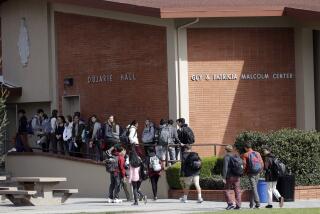Nonsmoker Wins Damages in Suit
- Share via
The tobacco industry Tuesday suffered its first defeat in a secondhand-smoke case when a Miami jury awarded $5.5 million to a flight attendant who claimed she suffered sinus inflammation from working in smoky airline cabins.
The victory by Lynn French, 56, after a two-week trial was the latest sign of juror anger at tobacco companies. The size of the verdict was particularly striking because sinusitis is not a life-threatening illness and French’s lawyers had sought only $1 million in damages. The award was intended as compensation for past and future pain and suffering, and French’s fear of getting cancer.
In statements issued after the verdict, Philip Morris USA and R.J. Reynolds Tobacco Co. said they would ask Miami-Dade Circuit Judge Fredricka G. Smith to set aside the verdict, and failing that, would appeal.
“Credible evidence does not exist to show that secondhand smoke causes chronic sinusitis in nonsmokers,” said Daniel P. Donahue, Reynolds’ senior vice president and deputy general counsel.
The jury deliberated 1 1/2 hours before finding the company and co-defendants Lorillard Tobacco Co. and Brown & Williamson Tobacco Corp. liable.
French and her lawyers could not be reached for comment. But Ed Sweda, a senior attorney with the Tobacco Products Liability Project, a Boston-based group that promotes lawsuits against the industry, said the verdict “will serve as a terrific educational tool for the public to demonstrate that ... indeed secondhand smoke is a significant hazard to nonsmokers.”
For the most part, secondhand smoke cases have not been considered a major threat to cigarette makers because causation of illness is hard to prove.
But the industry still faces an additional 3,000 lawsuits by flight attendants after a 1997 settlement of a nationwide class action, known as the Broin case. The case was filed on behalf of flight attendants claiming injuries from secondhand smoke. The settlement involved payment by the industry of $349 million for legal fees and health research.
None of that money went to the flight attendants, but the settlement set favorable ground rules for the airline workers to pursue individual claims, including shifting the burden of proof to tobacco companies to show that secondhand smoke was not responsible for causing illnesses. The settlement barred flight attendants from seeking punitive damages.
French’s was the third Broin-aftermath case to go to trial. Last June, another Miami jury sided with the defense in a case brought by former flight attendant Marie J. Fontana, who suffered from sarcoidosis, a severe lung disease. A second case ended in a mistrial last month.
More of the flight attendant claims are scheduled to be tried this summer.
Cigarette makers have complained that the Broin judge, Robert Kaye, improperly set a trial plan for the individual cases that barred the firms from raising certain defenses. This, they said, gives them strong grounds to appeal.
The jury in the French case returned its verdict after the stock markets had closed. Philip Morris Cos. shares were unchanged at $54.94, R.J. Reynolds Tobacco Holdings Inc. fell 81 cents to $63.84, and Loews Corp., parent of Lorillard Tobacco Co., rose 64 cents to $56.47, all on the New York Stock Exchange. American depositary receipts of British American Tobacco, parent of Brown & Williamson, gained 5 cents to $22.53 on the American Stock Exchange.
*
Times wire services were used in compiling this report.
More to Read
Inside the business of entertainment
The Wide Shot brings you news, analysis and insights on everything from streaming wars to production — and what it all means for the future.
You may occasionally receive promotional content from the Los Angeles Times.










